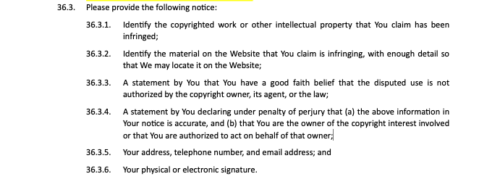The Data Protection Act (DPA) 2018 is the UK's updated data protection law which became effective on 25th May 2018 and was recently amended on the 1st January 2021 to reflect the United Kingdom's exit from the EU. It sits alongside the UK GDPR and replaces the Data Protection Act 1998. The United Kingdom is […]
What is a DMCA Notice and why you need it in your Terms and Conditions
DMCA stands for Digital Millennium Copyright Act. It is a United States copyright law that was passed on the 12th October 1998. It integrated two World Intellectual Property Organization Treaties to amend the copyrights law, these were the WIPO Copyright Treaty and the WIPO Performances and Phonograms Treaty. The law also exempted online service providers (OSP's) including Internet Service Providers (ISP's) against copyright infringement liability as long as they met certain requirements.

On this page
What is a DMCA Notice?
A DMCA notice is a formal way of informing a website that they are using copyrighted material without correct authorization. It covers any copyrighted material including:
- videos
- written words
- audio
- artwork
- pictures
- software
How Does the DMCA Relate to your Website?
The DMCA is applicable to websites hosted in the United States. This means that even if your website is located outside of the USA but you are hosted within the U.S., DMCA regulations still apply to you. However if your business is located outside of the U.S. you may know this clause as a Copyright Infringement clause.
If your website allows user generated content to be published, then those users need to own the rights to that content otherwise it may be considered an infringement. If the content is actually a copyright infringement then you may receive a DMCA notice, also known as a take-down notice, from the owner of the content.
As the website owner you may also have unknowingly used copyrighted material on your website without getting proper authorization to do so.
In either case you may be required to remove the content from your website if you receive a DMCA take-down notice.

DMCA Notice Requirements
Once a copyright owner has identified their content is being used without consent they can issue a DMCA take-down notice. The take-down notice must be in written form, identifying the copyright work and the material which is infringing on this copyright and include the following:
- signed by the copyright holder or their agent
- include a description of the copyrighted material and where it is located (URL) and show location of original content (URL)
- include contact details for the person submitting the notice (name, address, email and phone number)
- an accuracy statement, the information you have included in the DMCA take-down notice is true to the best of your knowledge.
- a good faith statement, you have reason to believe that the content you are requesting to be removed has not been authorized by you, the owner.
- a statement from the person who is issuing the take-down notice that includes that the information they have submitted is accurate and that they are either the copyright owner or are authorized to act on behalf of the copyright owner.
DMCA Clause in your Terms and Conditons

The DMCA clause can be found in the Terms and Conditions of a website. It allows copyright owners to know that your website responds to take-down notices and will remove the content if it is infringing on copyright laws.
The clause should include the DMCA requirements as shown in the image above, taken from our privacyterms.io generated Terms and Conditions and how to issue a DMCA notice.
It should also include information outlining how your users can file a DMCA counter notice, if they believe that the material has been incorrectly removed.

Does a DMCA Notice work outside of U.S.A.?
What happens in a scenario where the content has been used without consent outside of the U.S.? Or if you live outside of the U.S. and someone inside the U.S. uses your content without your consent?
In both cases you can issue a DMCA notice. The DMCA notice is really just a formal request asking for the take-down of content that has been used without approval or consent from the content owner.
If the notice is accepted and the person complies then you are done, otherwise you will need to pursue a legal course of action.
Receiving a DMCA Notice
What happens if you are the website owner and you receive a DMCA notice?
First thing is don't panic!
Check to see if the content has in fact been used without permission and then if it has remove it from your website immediately.
If you do not believe that you have used the content without consent then remove the offending content and try to attain who the content belongs to.
If the content is actually yours then you can reach out to the issuer of the DMCA take-down notice and explain the situation. The DMCA notice you will have received should have their contact details. If the notice was issued by mistake then the complainant can retract the DMCA notice. However if they react in a different way then you can issue a counter-notice.
Counter-notice
In the case that you receive a DMCA notice and you believe it is incorrect, you have reached out to the complainant and they have reacted in a negative way, you can issue a counter-notice.
The counter-notice must include the following:
- your signature
- the content you have removed and where it appeared before you removed it.
- a good faith statement explaining that you believe the content was published and/or removed due to an error.
- your contact information
- a statement from you saying that you will cooperate with the Federal District Court in your judicial district. In the case that you live outside of the U.S. you must still agree to your case being handled within the U.S.A.
The complainant now can choose to retract their DMCA notice or follow legal channels and issue a copyright lawsuit against you.

Tips for Intellectual Property
- Consider registering copyright on your intellectual material. This is not mandatory but it does make it much easier to prove the content is yours if someone uses it without your consent.
- If you are using someone else's content make sure you have the correct permissions or that the content is open source and available for use for free.
- Understand what Fair Use is and whether the content in question falls under this or not.
- In the case of your content, try reaching out to the offending website owner and requesting that the remove the unauthorized content that belongs to you. Often the offender has no idea that they are using the content unlawfully.
Conclusion
A DMCA notice is a formal way of requesting the removal of copyright infringement material from a website. It applies to website hosted in the U.S.A. even if your site os located outside of the U.S.
If you are the owner of a website then your Terms and Conditions should include a DMCA clause. this lets your users know that you honor the DMCA and how they can issue a DMCA take-down notice and how they can dispute a take-down notice via the use of a counter-notice.
If you receive a DMCA notice remove the offending content immediately while you ascertain whether you have used the content illegally or not.
If you think the notice was issued incorrectly, reach out to the complainant and explain the situation. If they continue with the complaint then you can issue a counter-notice.
Visit our Terms and Conditions generator for your DMCA clause inclusive Terms and Conditions Agreement.
Disclaimer
The information in this article is for informational purposes only and should not be construed as legal advice on any matter and does not create a lawyer-client relationship
